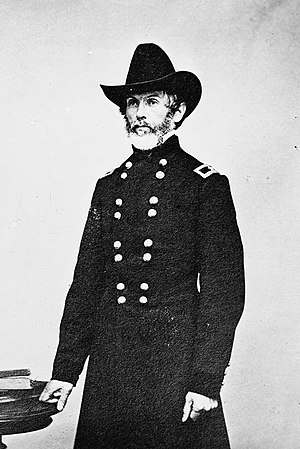Henry W. Wessells
Henry W. Wessells | |
|---|---|
 | |
| Born | February 20, 1809 Lietchfield, Connecticut |
| Died | January 12, 1889 (aged 79) Dover, Delaware |
| Buried | East Cemetery, Litchfield, Connecticut |
| Allegiance | United States of America Union |
| Service | United States Army Union Army |
| Years of service | 1833–1871 |
| Rank | |
| Commands | 6th US Infantry 8th Kansas Infantry |
| Battles / wars | Seminole Wars |
Henry Walton Wessells (February 20, 1809 – January 12, 1889) was a career United States Army officer, best known for his service during the American Civil War, including his surrender of Union fortifications during the Battle of Plymouth in 1864.
Biography
Early life
Wessells was born in Litchfield, Connecticut, Feb. 20, 1809. After he was graduated at West Point in 1833 he took part in the Second Seminole War, first as a second lieutenant of infantry and then as first lieutenant, being promoted on July 7, 1838. In Gen. Scott's Mexican campaign he was promoted captain and received the brevet of major for gallantry at Contreras and Churubusco. In the former contest Capt. Wessells, though wounded, seized the regimental flag on the death of the color sergeant and put himself at the head of his men. On his return from the war the state of Connecticut voted him a jeweled sword, which was presented to him with military ceremonies. Capt. Wessells was on the Pacific coast in 1849-54, and was in the Sioux expedition of 1855, after which he served in the Northwest till the Civil war.
Civil War
On June 6, 1861, he was promoted major of the 6th US Infantry, and on Aug. 22 of that year he received the colonelcy of the 8th Kansas Infantry. After serving on the Missouri border he resumed his commission in the regular army Feb. 15, 1862, and in March was transferred to the Army of the Potomac. He was made a brigadier-general of volunteers April 25 and served in the Peninsula, receiving the regular army brevet of lieutenant- colonel for gallantry at the Battle of Fair Oaks, where he was wounded. In Gen. George B. McClellan's change of base he commanded the rear-guard, and then engaged in the defense of Suffolk, Va., afterward serving in North Carolina. After serving at Kinston, Goldsboro, and New Berne, he was placed over the sub-district of the Albemarle, taking command May 3, 1863. On April 17, 1864, he was attacked at Plymouth, North Carolina, where he had a garrison of about 3,000 men, by Gen. Robert F. Hoke with about 15,000 Confederate troops and the iron-clad CSS Albemarle After a gallant defense which lasted three days Gen. Wessells surrendered the town. He was taken to Libby Prison, whence he was transferred successively to Danville, Macon and Charleston. At the last-named place he was one of the officers that were placed under the fire of the Union batteries on Morris island. On Aug. 3, 1864, he was exchanged, and on Nov. 11 he became commissary of prisoners, which post he held until the close of the war. He was also placed in charge of a conscription center in New York. He was promoted lieutenant-colonel Feb. 16, 1865, and brevetted colonel to date from April 20, 1864, "for gallant and meritorious services during the rebel attack on Plymouth, N. C." On March 13 he was given the regular army brevet of brigadier-general.
Later years
After the Civil War, Wessells served on the northwestern frontier as lieutenant-colonel of the 18th US Infantry till Jan. 1, 1871, when he was retired. After that time he resided in his native place of Litchfield, but at the time of his death he was on a visit to Delaware. Gen. Wessells died in Dover, Delaware, Jan. 12, 1889.
See also
References
- Appleton's Annual Cyclopaedia and Register of Important Events of the Year 1889. New York: D. Appleton and Company. 1890.
- Jones, Terry L. (2002). Historical Dictionary of the Civil War. Scarecrow Press.
- The Union Army: A History of Military Affairs in the Loyal States 1861-1865. Vol. 8 Bigraphical. 1908.
 This article incorporates text from this source, which is in the public domain.
This article incorporates text from this source, which is in the public domain.
